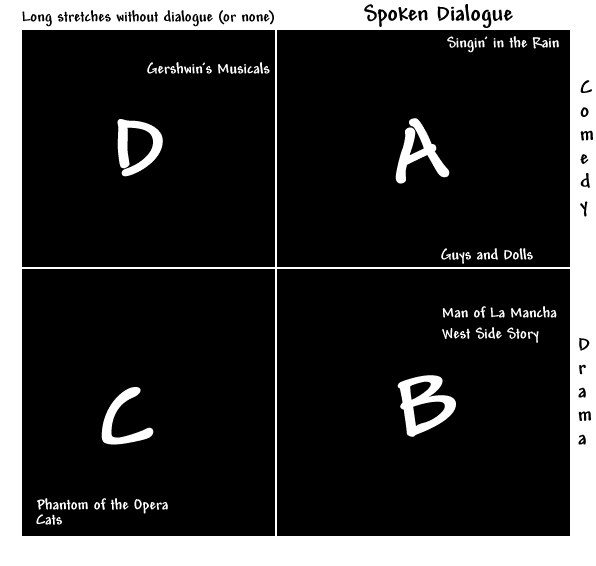|
A thumb up from Tuna, an abstention from Scoop, who can't vote because he is prejudiced against anything even vaguely similar to this. Scoop does, however, admire any film that inspires a great title for a porn film - in this case, All That Jizz. Scoop's comments in white: A large number, perhaps a vast majority, of heterosexual males despise some or all types of musicals. I don't hate them all, but I hate a certain kind, and I can describe that kind to you fairly accurately on a two dimensional scale. Dimension 1 - What do they do when they aren't singin'? If they are speaking, driving the story forward, I am more likely to enjoy the play. If they are dancing or if they are just singin' non-stop without spoken breaks, I am not likely to enjoy it. Dimension 2 - Is it funny? The funnier the better. In general, I like musical comedies, or musical dramas with a solid comic undertone. These dimensions produce musicals of four distinct types, as shown here:
I like Type A musicals - where the dance is incorporated naturally into the songs, the dancing is amusing and not necessarily spectacular, and there are plenty of jokes to keep the show flowing. I enjoy Singin' in the Rain, for example, and I miss true musical comedies, which have been extinct forever. I usually like Type B musicals if they are good ones, like West Side Story and Man of La Mancha, with a solid story and good tunes. I don't much care for Type D - alleged comedies where the comedy is actually just a lame excuse for production numbers. Don't get me wrong about Gershwin, whose musicals are listed here on the chart. I love his melodies. I sing them in the shower. He may be my favorite 20th century composer, but his musicals are just glorified Busby Berkley productions. The comedy is lame, and the musical numbers go on and on and on, long after I've lost interest in them. I usually find myself looking in the Playbill to see when the next good song is coming. |

